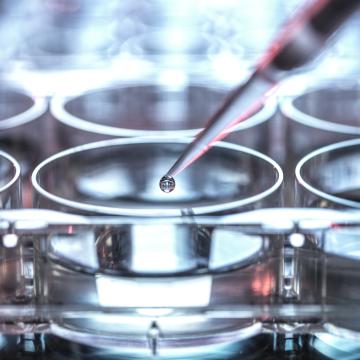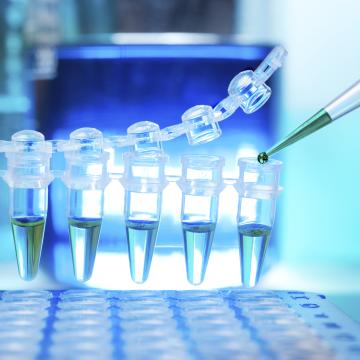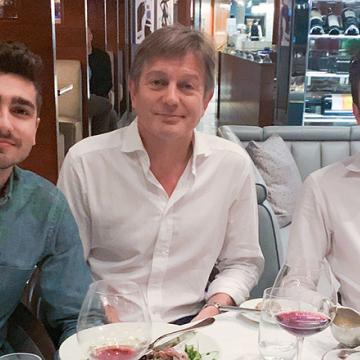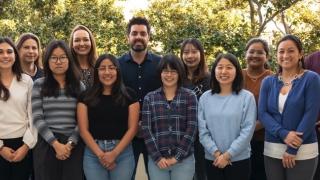
Saul Priceman Lab
Saul Priceman, Ph.D., is an associate professor in the Department of Hematology & Hematopoietic Cell Transplantation and associate director of Translational Sciences & Technologies in the T Cell Therapeutics Research Laboratories. Dr. Priceman is a principal investigator and provides scientific oversight on solid tumor immunotherapy programs focused on developing chimeric antigen receptor (CAR) T cells and rational combination approaches for prostate cancer, breast cancer brain metastasis, ovarian cancer, pancreatic cancer and other solid tumor types.
The overarching goal of the research program is to develop (CAR)-based T cell immunotherapy to treat solid tumors.
The lab primarily focuses on prostate, breast, ovarian and pancreatic cancers. It has recently initiated two phase 1 trials at City of Hope assessing CAR T cell therapy for treating patients with bone metastatic prostate cancer and patients with breast cancer brain metastasis.
Understanding and effectively targeting the immunosuppressive tumor micro-environment is critical to successfully translating CAR T cells to patients, which may limit the overall therapeutic potential of adoptive T cell approaches.
Therefore, the lab is building more relevant preclinical models to address the challenges facing T cell therapies for solid tumors and to evaluate innovative combination approaches to improve the overall immunotherapy response rates in patients.
An Associate Professor in the Department of Hematology & Hematopoietic Cell Transplantation, Saul Priceman conducts research that focuses on cancer immunotherapy, T cell biology and immunology.
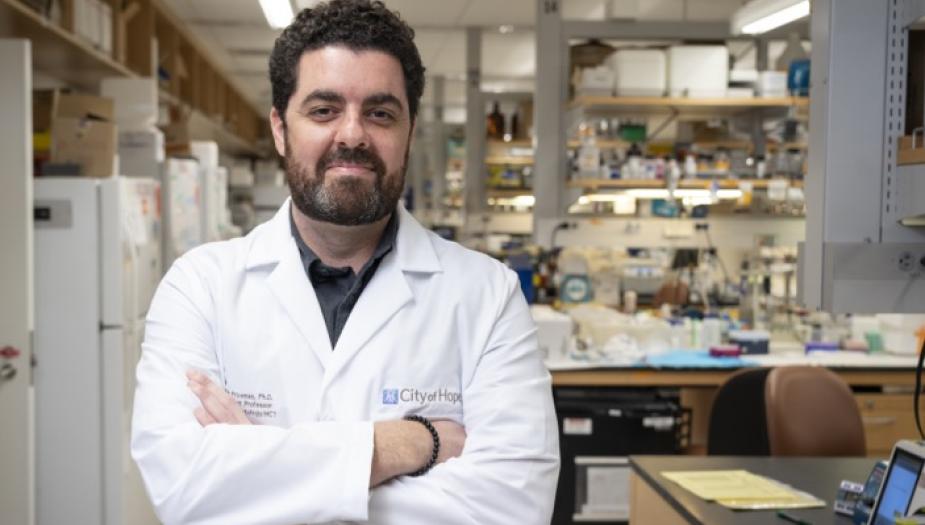
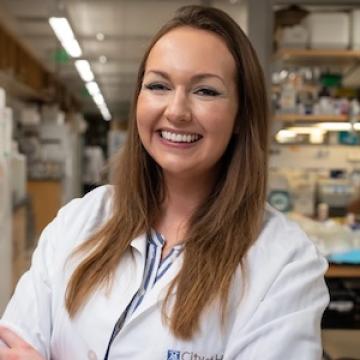

Lauren Adkins, M.S., earned her undergraduate degree in cell and molecular biology with a chemistry minor and a certificate of biotechnology from California State University, Long Beach, in 2014. From 2013 to 2014, she completed a full-time paid internship at the University of California, Irvine, researching optimizing the differentiation of human embryonic stem cells into choroid plexus epithelial cells. Lauren received her master's degree in biology in 2017 from California State University, Fullerton, during which she identified a novel group of β-catenin inhibitors as anti-cancer compounds and analyzed their mechanism of action. Previously at City of Hope, Lauren investigated the role of transcription factor ARID5A in adiposity, inflammation, obesity and insulin resistance and worked toward characterizing an ARID5A KO mouse model. Lauren is enthusiastic about joining the Priceman Lab and is currently involved in correlative studies for the HER2 BBM CAR T cell clinical trial, focusing on immune monitoring of patient samples.
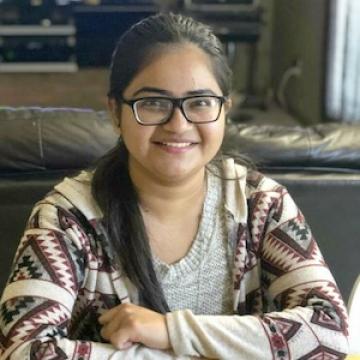

Lea Christian completed her B.S. in pharmacy from Gujarat Technological University, India. She received her M.S. in pharmacology and toxicology from Wright State University, Ohio; her research was on whether Xeroderma Pigmentosum A deficiency could generate increased microvesicle particles in response to UVB radiation. Christian joined the Priceman team as a Research Associate I. She aims to develop novel CAR T cells as an immunotherapy for solid tumors such as prostate cancer. Christian is excited to learn methods for developing CAR T cells as immunotherapy.
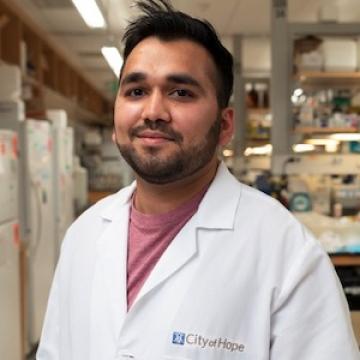

Gaurav Dhapola, M.S., received his B.Tech in biotechnology and bioinformatics in India and his M.S. degree from California State University, Channel Islands. During his master's program, Gaurav won the California Institute for Regenerative Medicine (CIRM) award, which led him to work as a paid intern in Dr. Jeanne Loring's lab at The Scripps Research Institute in San Diego, California. Gaurov's internship project focused on developing patient-specific cell therapy (iPSC) for Parkinson's disease. Gaurav also worked in Crown Bioscience as a Research Associate, during which he actively processed, cryopreserved, and analyzed Patient Derived Xenograft (PDX) data associated with different cancer types. Currently, Gaurav is involved in the Priceman Lab's correlative studies for the HER2 BBM and PSCA CAR T cell clinical trials, monitoring the immunogenicity of CAR T cells within collected patient samples.
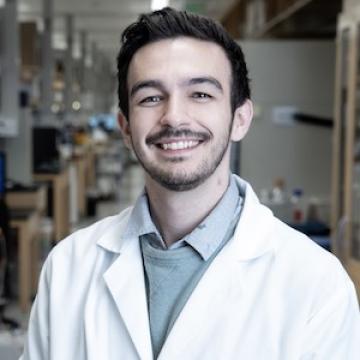

Jackson Gibson received his B.S. in nutrition science from California State Polytechnic University, Pomona, in 2018. His lab work began in 2017 as a summer intern through the Eugene and Ruth Roberts Summer Student Academy in the Priceman Lab, evaluating different modulators for maintaining naïve and memory phenotypes in proliferating T cells. Now a Research Associate II in the lab, his work has since shifted to developing a model for studying the tumor microenvironment and evaluating the interplay between myeloid cells and CAR T cells. In addition, Jackson is eager to learn different ways to augment the host immune response against solid tumors and hematological malignancies and eventually pursue an M.D. in pediatric oncology.
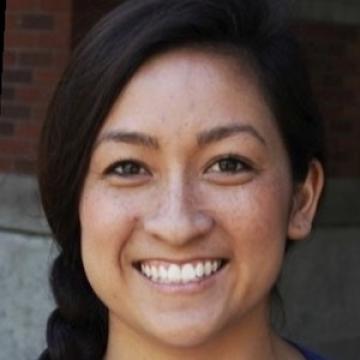

Neena Leggett earned her M.S. in biology, with an emphasis in bioinformatics, in 2014 from the University of Oregon, Eugene, Oregon. She spent the next few years developing pipelines and analyzing NGS data to characterize proteins involved in chromatin remodeling. In 2018, Neena moved to Los Angeles and began working remotely as a bioinformatics scientist at the University of Texas Health Science Center in Houston. She spent the next year performing genomic analyses and studying the effect of immunotherapy treatment in patients with advanced gastrointestinal cancer.
Before joining the Priceman Lab, Neena collaborated with the team, generating single-cell data for clinical projects. She continued this role and expanded her involvement to include data processing and analysis. By studying the dynamics of the immune landscape and tumor micro-environment on a single-cell level, Neena hopes her work will provide insight into CAR T therapy.
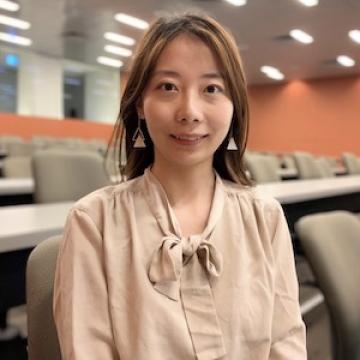

Jiangyue Liu (Venna) received her B.S. in biological pharmacy from Huazhong University of Science and Technology in China. She then earned an M.S. in immunology and microbiology from the University of Southern California, focusing on enhancing novel cell therapies targeting solid tumors. After graduation, Venna worked as an associate scientist in the industry to develop allogeneic CAR T therapy against mesothelioma in preclinical and translational settings. With a growing curiosity about cancer immunology and novel technologies, she joined the Priceman Lab as a Ph.D. student at Irell & Manella Graduate School of Biological Sciences in Duarte, California. She aims to explore the tumor micro-environment and potential strategies to promote CAR T cell function in combination with conventional cancer therapy and targeted therapy.
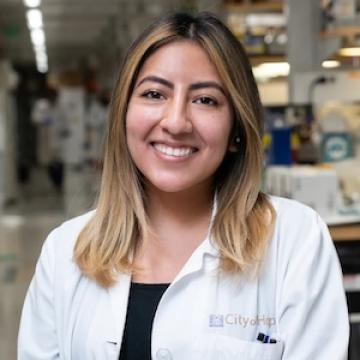

Lupita Lopez grew up in Fountain Valley, California, and earned her B.S. in molecular cell biology from California State University, Long Beach. She is currently working toward her Ph.D. at the Irell & Manella Graduate School of Biological Sciences at City of Hope. A 2018 H.N. & Frances Berger Foundation Fellow, Lupita focuses her doctoral work on cellular immunotherapy for treating metastatic prostate cancer through developing novel CAR T cells.
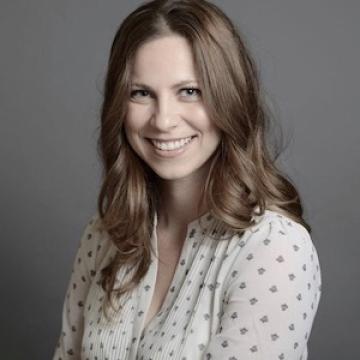

Catalina Martinez grew up in Los Angeles County. She received her B.A. in psychology from Cornell University and her certificate in clinical trials administration from the University of California, San Diego. Her background is in early-phase clinical protocol development for pediatric cancer therapies. She joined the Priceman Lab in 2019 and currently serves as a project development scientist for the City of Hope Clinical and Translational Project Development Core and project manager for Dr. Saul Priceman, managing grant submissions and current awards supporting the translational development of CAR T cell therapies for solid tumors.
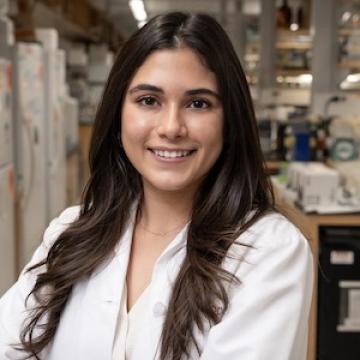

Isabel Monroy graduated from Yale University in 2021 with a degree in Molecular, Cellular, and Developmental Biology, B.S. While at Yale, her research focused on the differentiation of tumor-specific CD8+ T cells found in the tumor microenvironment, but her interest in cancer research began in high school when she studied different transcription factors and proteins that are involved in the formation of germ cell tumors at UCLA's David Geffen School of Medicine. Now in the Priceman Lab as a Research Associate I, Isabel works to combine CAR T cell therapies with oncolytic viruses to arm the immune response against solid tumors better. In the future, she aims to continue her passion for cancer treatment and research by pursuing a medical degree.
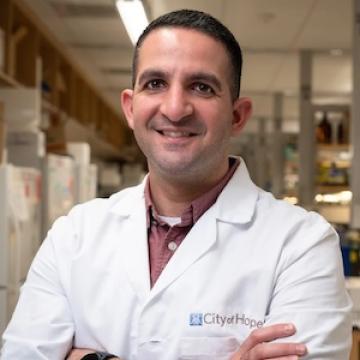

John Murad, Ph.D., grew up in Diamond Bar, California, and earned his B.S. in chemistry from California Polytechnic University Pomona. He completed his M.S. in pharmaceutical sciences at the Western University of Health Sciences, Pomona, focusing on platelet biology and G-protein coupled receptor function.
John received his Ph.D. from the Irell & Manella Graduate School of Biological Sciences at City of Hope in Duarte, California. A 2014 H.N. & Frances Berger Foundation Fellow, he focuses his doctoral work on cellular immunotherapy for treating solid tumors, including ovarian and prostate cancer, by developing novel CAR T cells.
John is actively involved in developing relevant tumor models in vitro and in vivo to recapitulate the tumor immune microenvironment and exploring how to use clinically relevant modalities to improve CAR T cell efficacy. He hopes the preclinical progress leads to promising immunotherapeutic strategies to enhance cancer patients' survival and quality of life.
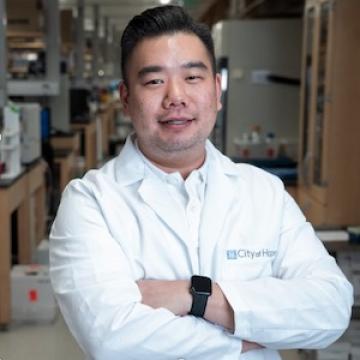

Anthony Park obtained his B.S. in biology from the University of California, San Diego. He then earned his M.S. from California State Polytechnic University, Pomona, evaluating the effects of THC on adaptive immunity due to fungal infections.
Anthony is currently a postdoctoral researcher in the Irell & Manella Graduate School of Biological Sciences at City of Hope in Duarte, California, investigating combination immunotherapies using oncolytic viruses and CAR T cells to treat various solid tumors, with an emphasis on understanding the immunological effects of each therapy alone and in combination.
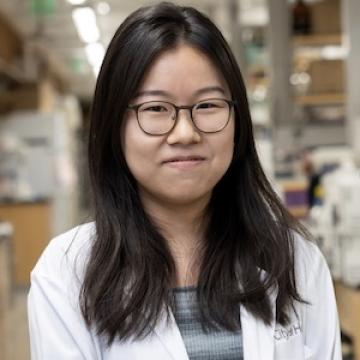

Yuwei Ren earned her B.S. in biological sciences from China Agricultural University in 2019. She then completed her M.S. in biomedical data analytics at the University of Southern California in 2022, where her research work involved recapitulating tumor micro-environments in microfluidic 3D models in vitro. She joined the Priceman Lab at City of Hope to continue working on cancer treatments after graduation. She is currently involved in developing combination therapies using CAR T-cells and oncolytic viruses.
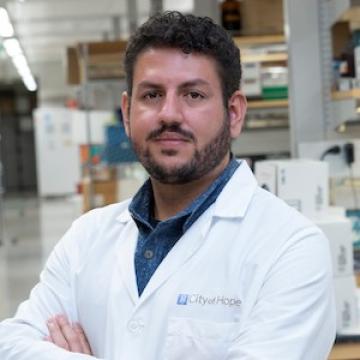

Reginaldo Rosa obtained his B.S. in biology from the University of Formiga (Brazil) in 2015. He then earned his M.S. and Ph.D. in Genetics from the University of Sao Paulo (Brazil) in 2022. During his Ph.D., Reginaldo investigated the genetic etiologies of Mismatch repair deficiency (MMR-D) in cancer by applying a combination of molecular biology and bioinformatics approaches. Part of this investigation was conducted at the Institut Gustave Roussy (Grand Paris, France), where he had the opportunity to collaborate on projects that explored the use of MMR-D as a biomarker to predict response to immune checkpoint inhibitors in a syngeneic model of breast cancer. Reginaldo joined the Priceman Lab as a postdoctoral fellow to advance the use of CAR-T cell-based immunotherapies to treat pancreatic cancer.
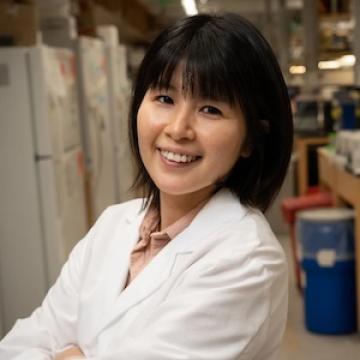

Yuki Yamaguchi, Ph.D., earned her B.S. in biology from the University of Hawaii in Manoa in 2009 and her Ph.D. in genetic, molecular and cellular biology from the University of Southern California in 2015. In graduate school, she studied mammalian heart development and regeneration and became interested in immune cells' roles in various diseases, including cardiac ischemic injury. Yuki pursued her interest and joined the lab as a postdoctoral fellow to study the roles of suppressive immune cells in solid tumors and how to improve CAR T cells to overcome immune suppression. She is now a staff scientist in the Priceman Lab and leads the development of humanized murine models that better mimic the solid tumor micro-environment and CAR T cell-induced toxicities. Her goal is to contribute to advancing cell-based therapies, and she is excited to grow with the immunotherapy program at City of Hope.
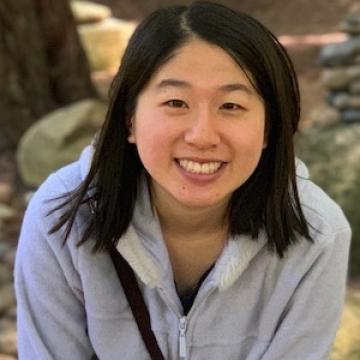

Cari Young grew up in San Francisco, California, and earned her B.S. in biotechnology from the University of California, Davis. She entered the Irell & Manella Graduate School of Biological Sciences at City of Hope in Duarte, California, in 2019 to pursue her Ph.D. and was awarded the H.N. & Frances Berger Foundation Fellowship during her first year. Cari then joined the Priceman Lab in 2020 to explore the effects of combining CAR T cells with focal radiotherapy against prostate cancer. She hopes to understand how this combination therapy may transform the solid tumor micro-environment, enhance CAR T cell activity, and improve treatment outcomes for patients in the clinic.
- Ethan Gerdts, B.S. – UCSD in the M.D. program
- Brook Jeang, M.S. – UCI in the Ph.D. program
- Kelly Kennewick, B.S. – UCLA in the Ph.D. program
- Dileshni Tilakawardane, M.S. – City of Hope in T Cell Therapeutics Research Laboratory Regulatory Affairs
- Anna Kozlowska, Ph.D. – Fate Therapeutics in San Diego
- Rudra Bhowmick, Ph.D. – Kite Pharma
- Jason Yang – OHSU in the M.D. program
- Eric Lee, B.S. – Ph.D. Graduate Student, Georgia Tech
We collaborate with organizations in progressing the development of new treatments in our specialized areas of research.
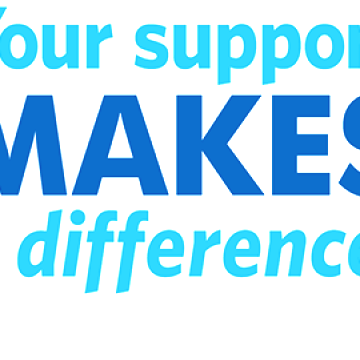
- STOP Cancer Foundation
- Oxnard Foundation
- National Comprehensive Cancer Network
Latest Research News
34.1293487, -117.9726643
Duarte , CA 91010
